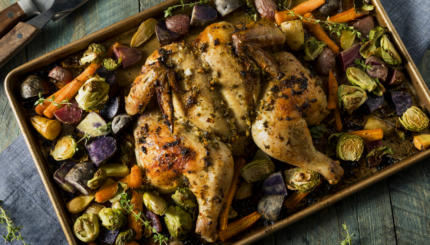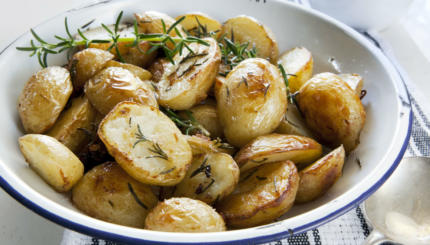
Eat Bread.
Your weekdays are probably very fast paced. Between meetings, commutes, and social events, eating turns into something you do on the run. Who has time to make a home cooked meal when you can heat up some leftover Chinese in five minutes?
The Sabbath is different. Shabbat is a time of celebration and rejoicing. And the best way to celebrate it is to sit down and enjoy a meal with family and friends.
The Ten Principles |
| 1. Avoid technology. 2. Connect with loved ones. 3. Nurture your health. 4. Get outside. 5. Avoid commerce. 6. Light candles. 7. Drink wine. 8. Eat bread. 9. Find silence. 10. Give back. |
The Talmud suggests that one eat three meals on Shabbat. This might seem pretty normal to you, but at the time the law was written, people normally only ate two meals per day. The Shulhan Arukh, the medieval compendium of Jewish law, says that the third meal is meant to honor the Sabbath as a special day that is distinct from the rest of the week. That third meal is so important that even if you are full from a big lunch, you should still sit down and eat a meal in the evening—even if it is very small.

Help us keep Jewish knowledge accessible to millions of people around the world.
Your donation to My Jewish Learning fuels endless journeys of Jewish discovery. With your help, My Jewish Learning can continue to provide nonstop opportunities for learning, connection and growth.
What differentiates a small meal from a snack? In pre-modern times (and, for many, this still stands) a meal wasn’t complete without bread, which is why eating bread became a ritual part of Sabbath meals.
You may notice that at many Shabbat meals, people place two loaves of bread on the table. The Book of Exodus says that on Fridays, the Israelites were commanded to go out and gather double the amount of manna (the food provided for them in the desert) so they would not have to gather on the Sabbath. What we know today as challah actually only became the traditional Shabbat bread after it was adopted from the German egg bread, brioche. However, it has only recently become adopted by the Sephardic community, who traditionally would make a flat bread that is more similar to a pita.
Some Sephardic Jews actually have twelve loaves of bread on their table– the amount of loaves used in the ancient Temple. Traditionally, the challah is preceded by kiddush (said over wine) and ritual hand washing. After washing hands, the hamotzi blessing is said and bread is eaten.
Because eating bread on Shabbat is a throwback–a reference to those extra portions in the dessert–it’s a good time to go full retro. Instead of nuking a hot pocket, consider getting all 1950s housewife–bake some challah, cook some chicken, and get dressed up. Because the Sabbath is a time to celebrate.
challah
Pronounced: KHAH-luh, Origin: Hebrew, ceremonial bread eaten on Shabbat and Jewish holidays.

Help us keep Jewish knowledge accessible to millions of people around the world.
Your donation to My Jewish Learning fuels endless journeys of Jewish discovery. With your help, My Jewish Learning can continue to provide nonstop opportunities for learning, connection and growth.
Sephardic
Pronounced: seh-FAR-dik, Origin: Hebrew, describing Jews descending from the Jews of Spain.

Help us keep Jewish knowledge accessible to millions of people around the world.
Your donation to My Jewish Learning fuels endless journeys of Jewish discovery. With your help, My Jewish Learning can continue to provide nonstop opportunities for learning, connection and growth.
Shabbat
Pronounced: shuh-BAHT or shah-BAHT, Origin: Hebrew, the Sabbath, from sundown Friday to sundown Saturday.

Help us keep Jewish knowledge accessible to millions of people around the world.
Your donation to My Jewish Learning fuels endless journeys of Jewish discovery. With your help, My Jewish Learning can continue to provide nonstop opportunities for learning, connection and growth.
Talmud
Pronounced: TALL-mud, Origin: Hebrew, the set of teachings and commentaries on the Torah that form the basis for Jewish law. Comprised of the Mishnah and the Gemara, it contains the opinions of thousands of rabbis from different periods in Jewish history.

Help us keep Jewish knowledge accessible to millions of people around the world.
Your donation to My Jewish Learning fuels endless journeys of Jewish discovery. With your help, My Jewish Learning can continue to provide nonstop opportunities for learning, connection and growth.


